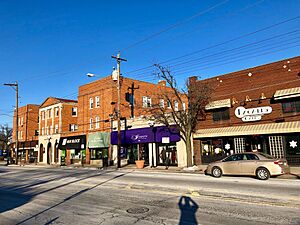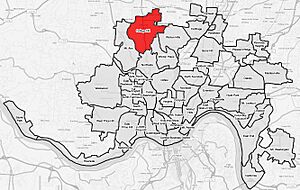College Hill, Cincinnati facts for kids
Quick facts for kids
College Hill
|
|
|---|---|
|
Neighborhood of Cincinnati
|
|

Hamilton Avenue in College Hill, Cincinnati
|
|

College Hill (red) within Cincinnati, Ohio
|
|
| Country | United States |
| State | Ohio |
| County | Hamilton |
| City | Cincinnati |
| Population
(2020)
|
|
| • Total | 16,039 |
College Hill is one of the 52 neighborhoods in Cincinnati, Ohio. It was started in 1813 and later became part of Cincinnati in different steps between 1911 and 1923. You can find it in the northwestern part of the city.
The area was first called Pleasant Hill because it was a nice place to live. Later, it was renamed College Hill. This new name came from two colleges that were built there in the mid-1800s. About 16,039 people lived in College Hill in 2020. It is important not to confuse College Hill with North College Hill, which is a separate town next door.
Contents
History of College Hill
In 1813, a man named William Cary bought a large piece of land north of Cincinnati. He had moved to Cincinnati from New Hampshire. Mr. Cary built a log cabin and moved his family to this new area.
Early Schools and Colleges
In 1833, William Cary's son, Freeman G. Cary, started a school for boys. It was called Pleasant Hill Academy. This school was built on part of his family's land. In 1846, the academy became an agricultural school. It was renamed Farmer's College. This is why the area became known as College Hill.
Farmer's College later changed its name to Belmont College in 1885. Then, in 1890, it became the main part of the Ohio Military Institute. Another important school, the Ohio Female College, opened in 1852. This school was for girls. It operated until 1873. After it closed, the land was used to build the Cincinnati Sanitarium. This was the first private hospital in the United States for people needing mental health care, outside of the East Coast.
Growth and Development
The area grew much faster after new ways to travel arrived. A railroad line was built in 1851. Then, horse-drawn streetcars started running in the 1860s. These made it easier for people to get to and from College Hill.
College Hill officially became a village in 1866. Later, it joined the city of Cincinnati in several steps. These happened in 1911, 1915, and 1923.
Historic Buildings in College Hill
Many buildings in College Hill are very old and important. They are listed on the National Register of Historic Places. Some of these include Laurel Court, the College Hill Town Hall, and the Old College Hill Post Office.
Population of College Hill
| Population of College Hill 1950-2020 | ||
|---|---|---|
| Year | Pop. | ±% |
| 1950 | 10,492 | — |
| 1960 | 15,198 | +44.9% |
| 1965 | 19,632 | +29.2% |
| 1970 | 21,590 | +10.0% |
| 1980 | 17,327 | −19.7% |
| 1990 | 15,785 | −8.9% |
| 2000 | 15,269 | −3.3% |
| 2010 | 14,133 | −7.4% |
| 2020 | 16,039 | +13.5% |
In 2020, there were 16,039 people living in College Hill. There were also 7,624 homes in the neighborhood.
About 22.8% of the people living there were under 18 years old. Most people, 59.2%, were between 18 and 64 years old. About 18.0% of the population was 65 years old or older.
Notable People from College Hill
- John E. Bruce, a former mayor
- Samuel Fenton Cary, a representative and leader in the temperance movement
- Cornelia Laws St. John, a poet
Gallery
 | Aurelia Browder |
 | Nannie Helen Burroughs |
 | Michelle Alexander |




